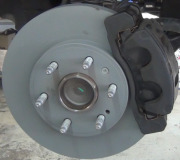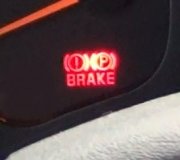Dandy observation. Try to get this to act up again, then loosen the mounting nuts for the master cylinder, then pull it forward a little. If that does not let the brakes release, it is likely you installed a used master cylinder that was contaminated with a petroleum product. That would cause the rubber lip seals to grow past the fluid return ports and block them.
If the brakes do release, there's two things to look for. The first is if the push rod coming out of the power booster is adjustable. This is much more common on import vehicles, but check for that anyway. If it is adjustable, shorten it by 1/8".
Next, look for anything that is holding the brake pedal from returning the last inch or two. If your truck does not have cruise control, it uses an adjustable brake light switch. That is not self-adjusting as it is on other truck brands. Check if the mounting bracket for the switch has been bent, or if the switch was recently replaced and not adjusted correctly. That will hold the brake pedal down a little and prevent the trapped brake fluid from returning as it heats up and expands.
SPONSORED LINKS
Wednesday, February 27th, 2019 AT 5:39 PM




